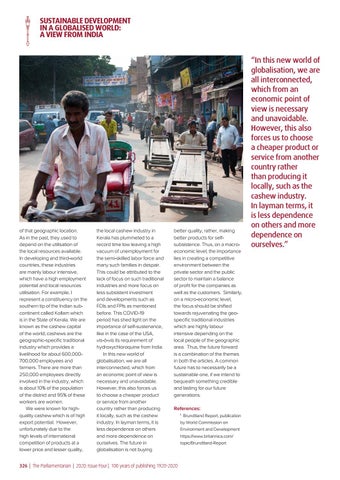SUSTAINABLE DEVELOPMENT IN A GLOBALISED WORLD: A VIEW FROM INDIA
of that geographic location. As in the past, they used to depend on the utilisation of the local resources available. In developing and third-world countries, these industries are mainly labour intensive, which have a high employment potential and local resources utilisation. For example, I represent a constituency on the southern tip of the Indian subcontinent called Kollam which is in the State of Kerala. We are known as the cashew capital of the world; cashews are the geographic-specific traditional industry which provides a livelihood for about 600,000700,000 employees and farmers. There are more than 250,000 employees directly involved in the industry, which is about 10% of the population of the district and 95% of these workers are women. We were known for highquality cashew which is of high export potential. However, unfortunately due to the high levels of international competition of products at a lower price and lesser quality,
the local cashew industry in Kerala has plummeted to a record time low leaving a high vacuum of unemployment for the semi-skilled labor force and many such families in despair. This could be attributed to the lack of focus on such traditional industries and more focus on less subsistent investment and developments such as FDIs and FPIs as mentioned before. This COVID-19 period has shed light on the importance of self-sustenance, like in the case of the USA, vis-à-vis its requirement of hydroxychloroquine from India. In this new world of globalisation, we are all interconnected, which from an economic point of view is necessary and unavoidable. However, this also forces us to choose a cheaper product or service from another country rather than producing it locally, such as the cashew industry. In layman terms, it is less dependence on others and more dependence on ourselves. The future in globalisation is not buying
better quality, rather, making better products for selfsubsistence. Thus, on a macroeconomic level, the importance lies in creating a competitive environment between the private sector and the public sector to maintain a balance of profit for the companies as well as the customers. Similarly, on a micro-economic level, the focus should be shifted towards rejuvenating the geospecific traditional industries which are highly labour intensive depending on the local people of the geographic area. Thus, the future forward is a combination of the themes in both the articles. A common future has to necessarily be a sustainable one, if we intend to bequeath something credible and lasting for our future generations. References:
326 | The Parliamentarian | 2020: Issue Four | 100 years of publishing 1920-2020
Brundtland Report, publication by World Commission on Environment and Development https://www.britannica.com/ topic/Brundtland-Report 1
“In this new world of globalisation, we are all interconnected, which from an economic point of view is necessary and unavoidable. However, this also forces us to choose a cheaper product or service from another country rather than producing it locally, such as the cashew industry. In layman terms, it is less dependence on others and more dependence on ourselves.”
